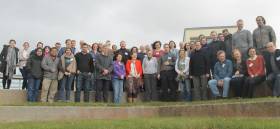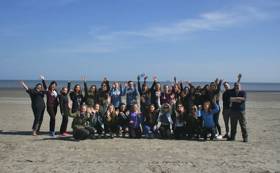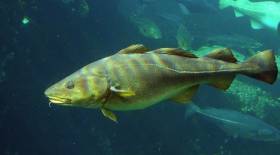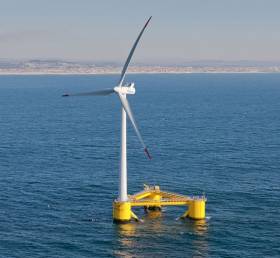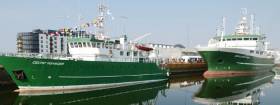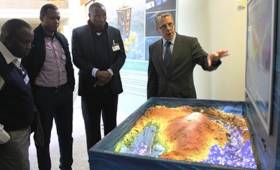Displaying items by tag: Marine Institute
Marine Institute Hosts Ocean Explorers at Oranmore
The Marine Institute held the second bi-annual research vessel users conference today at its headquarters in Oranmore, Galway to discuss the vast range of capabilities of both the RV Celtic Explorer and RV Celtic Voyager after their 2015 refits, as well as the use of the remotely operated vehicle, ROV Holland 1.
Director Mick Gillooly of Ocean Science and Information Services, Marine Institute, welcomed the attendance of over 70 marine scientists and researchers who will go to sea on the national research vessels this year. He said: “The demand for survey time on the national research vessels and the quality marine research being carried out across the country shows that Ireland’s scientists are answering the call to better understand our oceans.”
“At a time when we can all see the impacts of climate change, it’s more important than ever to carry out research at sea, including oceanography, fisheries, and environmental monitoring.”
The conference provided information about using high resolution multi-beam mapping, the capabilities of the ROV Holland 1 on surveys as well as key speaker’s experiences using the equipment.
Dr Florian Le Pape of the Dublin Institute for Advanced Studies (DIAS) spoke about the deployment of an Ocean Bottom Seismometer (OBS) network off the Irish shelf as far as the Rockall Trough. Dr Le Pape recently deployed 10 Broad Band OBSs from the RV Celtic Explorer as part of an innovative research program between DIAS, the Helmholtz Centre GFZ Potsdam, Germany and instruments provided by the Alfred Wegener Institute, Germany, which uses the noise from ocean waves to generate seismic images of the earth’s crust.
Over 70 marine scientists attended the Research Vessel Users Conference at the Marine Institute. Deep sea mud volcanoes off the gulf of Cadiz and the high resolution multi-beam mapping of World War 1 shipwrecks in the Irish Sea highlighted the advanced capabilities of the research vessels for deep sea exploration.
The workshop was organised by the Marine Institute’s research vessel operations team also highlighted the value of ship time. Mr Aodhan Fitzgerald, Research Vessel Operations Manager, spoke about the future vessel availability, the ship-time competition for 2017, and how to prepare a strong research survey proposal.
The Marine Institute’s ship-time programme will provide €3 million funding in 2016 supporting 256 research days onboard the national research vessels, RV Celtic Explorer and RV Celtic Voyager. The programme gives researchers access to the national research vessels, as well as the remotely operated submarine ROV Holland I to carry out surveys that further our understanding of the ocean, support policy and development, as well as providing essential training to young researchers and undergraduates.
The programme is part of a busy schedule of research vessel programmes that includes statutory fish stock assessment, environmental monitoring, and seabed mapping surveys in Irish Waters and across the Atlantic basin to Newfoundland.
You can follow the surveys of the research vessels on the blog http://scientistsatsea.blogspot.ie where scientist on-board the national research vessels blog about their research at sea
Bringing The Ocean Into The Classroom
#MarineScience - Dublin City University's St Patrick's Campus and the Marine Institute ran a pilot marine module with over 40 student teachers this week, giving them an opportunity to learn about teaching marine science and Ireland’s marine heritage.
Marine Institute chief executive Dr Peter Heffernan welcomed the collaboration with DCU to introduce themes relating to the marine environment into the science module.
“We recognise the unique position teachers have to help students develop an understanding of our amazing ocean resources," he said. "We hope these teachers will inspire curiosity among their students to learn more about the ocean and to develop an understanding of how we influence the ocean and how the ocean influences us.”
With a focus on a 'Marine Day' on 20 April on campus and in and the wider university, the oceans, seas and shorelines around Ireland present many opportunities to introduce marine themes into a range of cross curricular lessons,” explained Dr Thomas McCloughlin lecturer and lab manager of science at DCU's St Patricks Campus.
The Marine Institute provided a saltwater aquarium as well as a tidal tank for the modules, showing how bringing the seashore to the class provides an exciting way to learn about marine animals typically found on the seashore.
The programme was delivered to over 40 second- and third-year student teachers and included a field trip to the seashore and a range of interactive presentations in class.
“Student teachers get to explore the seashore through field trips as well as analysing specimens through examination and dissection in class. This allows them to integrate examining the biological themes of the marine as well as introducing social, physical-human and geographical influences relating to understanding and ocean resource,” said Dr Noirin Burke of the Galway Atlantaquaria, representing the Marine Institute’s primary school Explorers Education Programme.
Ireland has a seabed territory of approximately 880,000 sq km, 10 times greater than the size of the island of Ireland, making this one of the largest maritime member states of the European Union.
“Therefore, with Ireland being responsible for such a significant ocean resource, it is considered fundamental to teach Irish children, particularly as we are an Island nation, the historical and cultural values as well as the geographical and scientific backgrounds of our marine environment,” said Cushla Dromgool-Regan, responsible for the strategic development of education at the Marine Institute.
The pilot is supported by the Marine Institute and the Explorers Education Programme, which aims to build on Ireland’s marine and maritime heritage by increasing awareness of the value, opportunities and social benefits of our ocean wealth and identity.
The pilot was supported by Explorer Education Centres, Galway Atlantaquaria, Blackrock Education Centre and Sea Life Bray. For more information about the Explorers Education Programme see www.explorers.ie.
#PublicLecture - 'The Little Ice Age and the North Atlantic Fish Revolution' is the title of a public lecture delivered by Prof Poul Holm and Dr Francis Ludlow of Trinity College Dublin at lunchtime this Wednesday 13 April at the Marine Institute headquarters in Oranmore, Co Galway.
Holm is Professor of Environmental History at the School of Histories and Humanities in TCD. In 2015 he was awarded an Advanced Grant of €2.5 million by the European Research Council. In the next five years he and his team will explore the North Atlantic 'fish revolution' circa 1400-1700 AD.
In 1497, John Cabot returned to Bristol from a voyage across the North Atlantic. He told of waters so thick with fish that they could be lifted straight on board in baskets. Within a few years of this journey, fishermen from all over Western Europe made the journey across. This was the beginning of the 'fish revolution' of the early-modern world.
The fish revolution was one of the first examples of the disrupting effects of globalisation and climate change. Fish was a high-priced, limited resource in the Late Middle Ages. The Grand Banks fishery offered abundant high-quality low-priced catches to the European market. At the same time climate worsened as the Little Ice Age drove down sea temperatures and changed marine ecosystems.
The consequences were dire for fishermen along the coasts from the Irish Sea right up to northern Norway. As they caught less cod locally at higher prices, the fishermen had the choice of migrating across the ocean or give up fishing. Many fishing settlements were deserted as inhabitants took to the road to seek casual work in agriculture or towns.
Kings and high politics were similarly affected by the fish revolution. The new resource held strategic importance for all major western European powers, such as Spain, Britain and France. North Atlantic warfare was about fish as well as about gold.
In recent years we have all been affected by the impact of global change. We want to know if we can untangle the drivers of prices and temperatures to explain the causes of the fish revolution, and we want to know how people understood and responded to the challenges of globalisation and climate change. The lecture posits that perhaps the fish revolution of the Middle Ages is a distant mirror for today.
All are welcome to the event at the Marine Institute Auditorium this Wednesday at 12 noon.
#PowerFromTheSea - The Irish Times reports that the Marine Institute hopes to install wind turbines in Galway Bay for an offshore renewable energy trial.
Permission is being sought for up to three turbines, with a maximum height of 35m above sea level, that would be installed at different times at the current ocean energy test site off Spiddal, along with a prototype offshore power generating station that would cover an area of 37 hectares.
The entire project will open for public consultation on Monday 18 April. The Irish Times has more on the story HERE.
This story was updated to correct the previously reported 60m height of the turbines, which, according to the Marine Institute, was based on a error in the lease application form. The Marine Institute also clarified that the turbines would not be installed concurrently.
The Marine Institute is looking for an experienced manager to join our team in Rinville, Oranmore, Co. Galway as Director of Marine Environment and Food Safety Services. The Marine Institute is the national agency responsible for marine research, technology, development and innovation.
This is an exciting and challenging opportunity to manage one of six service groups within the Marine Institute. Marine Environment and Food Safety Services includes seafood safety testing and monitoring to ensure consumer protection; extensive environmental monitoring programmes to ensure the protection of the marine environment and meet environmental legislation obligations; as well as providing technical and scientific advice to support the sustainable development of the aquaculture industry and other sectors.
We're looking for a motivated and impactful communicator with experience of building effective relationships with stakeholders at a senior level to play a key role as a member of the Marine Institute management team. The successful candidate will work with the management team to develop the Institute's strategic direction and focus and will lead teams including marine environment, fish and shellfish safety, fish health services, ocean chemistry, sea lice monitoring, licensing and policy advice, and quality programmes.
The closing date for applications is 12 noon on Friday 18th March 2016. For more information download the detailed job description.
Marine Institute Hosts Kenyan Delegation
#MarineScience - On Wednesday 17 February the Marine Institute hosted a delegation of officials from the Kenyan Ministry of Agriculture, Livestock and Fisheries.
The delegation, headed by Micheni Ntiba, Secretary General of the Ministry of Agriculture, Livestock and Fisheries, was greeted by Dr Paul Connolly, director of fisheries ecosystems advisory services, who gave an overview of the work carried out at the Marine Institute and highlighted the extensive range of research vessel surveys that support fisheries management.
Tommy Furey of INFOMAR demonstrated how we can map the seabed using the latest technology and also demonstrated the importance of topography, contouring, geology and seabed mapping with Ireland’s first augmented reality (AR) sandbox.
The AR sandbox is based on a concept first developed as part of a National Science Foundation (NSF) funded project lead by visualisation collaboration KeckCAVES at the University of California.
The Delegation toured the building to get a first-hand glimpse of the work undertaken, visiting the biotoxin lab to learn about the work involved in the biotoxin monitoring programme, and the underwater TV survey lab, viewing footage of the burrows of Dublin Bay prawn (Nephrops norvegicus), getting an insight into some of the services provided to the Irish Government.
The delegation remarked that they could see may ideas that could be used in Kenya and that they could learn a lot from the Irish experience with Harnessing Our Ocean Wealth.
Kenya is very interested in developing an integrated marine plan for their ocean resources and the delegates were very interested to hear about Ireland’s Harnessing Our Ocean Wealth strategy and how it has progressed.
There is a new acceptance in Kenya on the importance of the ocean and its potential to contribute to the Kenyan economy.
Marine Institute Board Appoints New Members
#MarineInstitute - The Marine Institute’s new board met for the first time this week at its headquarters in Oranmore, Co Galway where they also had the opportunity to meet many of the staff.
Four new board members were appointed for a period of five years, including Dermot Clohessy, former executive director of the IDA, and Alan Dobson, Professor of Environmental Microbiology at University College Cork.
Also appointed were Prof Owen Lewis, former chief executive of the Sustainable Energy Authority of Ireland (SEAI), and Lorcán Ó Cinnéide, former CEO of the Irish Fish Producers Organisation (IFPO), who was previously a board member from 2010 to 2015.
Marine Institute board chair Dr John Killeen and chief executive Dr Peter Heffernan welcomed their appointment.
"We are delighted to welcome our new board members as they bring new skills and experience to the highly committed board," said Dr Killeen. "The work of the board will be enhanced by the contributions of such high calibre individuals, working together to help build Ireland’s marine sector.”
Dr Heffernan added: “Each of our new board members embody the spirit of community and bring talent, expertise and energy to the table. We are very fortunate to have them by our side as we continue to strengthen our efforts in marine research and innovation.”
More information on the board and the organisation's structure is available on the Marine Institute website HERE.
Marine Institute Offers Work Experience Bursaries
The Marine Institute is inviting students to apply for a number of work experience placements in many exciting areas for this summer 2016. The bursaries are worth €275per week for an 8 to 12 week placement (bursary dependant).They will be based in various locations including the Marine Institute Oranmore, Co. Galway, Newport, Co. Mayo and Wilton Park House, Dublin and other locations/ ports around the country.
The Marine Institute's Bursary Programme provides valuable practical experience for students, in areas of research such Marine Fisheries, Salmon Management, Aquaculture, Environment, Communications, Research Office, Oceanography, Library, Web development, Maritime Development and Fish Health Unit.
The Bursary Programme is aimed at undergraduates of Universities, Institutes of Technology and National Institutes for Higher Education. The Scheme is strictly limited to undergraduates who will have completed two years study in a relevant discipline by the beginning of June.
Previous bursars have gone on to work in the Marine Institute (including two Directors of the Institute), BIM, Regional Fisheries Boards, county councils, pharmaceutical companies, State Laboratories, with some going as far afield as the EPA in Sydney Australia and some now running their own companies.
Marine Researchers Brave Elements For Workshop On Cross-Cutting Opportunities In EU Funding
#MarineScience - More than 60 marine researchers from third level institutes, Government agencies and SMEs braved the elements to get to the Marine Institute in Oranmore on Thursday 7 January for information and advice on the many EU funding opportunities for marine research.
The workshop – titled Cross Cutting Marine Opportunities in EU Funding, as previously reported on Afloat.ie – was organised by the Marine Institute’s Research Office.
Welcoming participants, John Evans, director of policy, innovation and research at the Marine Institute, highlighted the success of Ireland’s marine researchers to date in winning competitive EU funding.
“Irish researchers have won 3.6% of the available funding for Blue Growth topics under the most recent round of results announced by the European Commission for Horizon 2020 Societal Challenge 2, and this rises to 4.6% when marine related topics relating to sustainable food security are considered," he said.
"This is becoming a consistent pattern, with Irish marine researchers winning more European competitive funding than would be expected from a country our size.”
Evans also spoke of the need for a focus on national research collaboration to maintain and improve this competitive position, and the importance of relevant national strategies as tools for researchers preparing funding proposals, specifically Harnessing Our Ocean Wealth – An Integrated Marine Plan for Ireland, and the National Strategy for Science, Technology and Innovation 2015-2020.
The Marine Institute's Dr Fiona Grant, national contact point for marine aspects of Horizon 2020 Societal Challenge 2, gave an overview of the priority topics for Blue Growth with a total of €148.5m available funding with contributions from the Climate, Energy and Transport parts of the Horizon 2020 programme.
'Linking healthy oceans and seas with healthy people’ was one of the key topics covered. Dr Grant mentioned the concept of the ocean as a "blue gym", citing a recent European Marine Board position paper that shows the significant impact of the oceans on human health and wellbeing.
Dr Sean McCarthy of Hyperion Ltd gave very practical advice on how to write a competitive Horizon 2020 proposal, with lots of insights for both new and experienced funding applicants. He told scientists to focus on the potential impact of the research proposal.
“Begin your proposal with impact – the impact is the big issue. Then write the science around the impact,” he said.
Other advice from Dr McCarthy included contacting the national contact point to ensure a better success rate.
“When writing your proposal it’s important to understand how the research priorities have been selected and the national contact point can give you insight into this,” he added.
Gerry Finn, director of the Northern and Western Regional Assembly and national contact point for the INTERREG Atlantic Area, gave an overview of the INTERREG Atlantic Area Programme 2014-2020 and success stories from the 2007-2013 ERDF programmes., under which €12.9m in ERDF funding was approved to 56 Irish projects.
Also speaking on the day was Michael O’Brien, EU Programme liaison officer, who gave an overview of eligibility criteria and guidelines on what makes a successful proposal under this financing mechanism. Four priority areas have been identified which include:
- Stimulating innovation and competitiveness.
- Fostering resource efficiency.
- Strengthening the territory’s resilience to risks of natural, climate and human origin.
- Enhancing biodiversity and the natural and cultural assets.
Over €140m will be available under the call from 2014-2020 which is expected to be launched in the middle of 2016.
O’Brien advised that the technical parameters "are not formally agreed yet by the member states and there may be further changes over the coming weeks. The working group for the programme meets again shortly to advance the progress on the programme manual and application process.”
#MarineNotice - The latest Marine Notice from the Department of Transport, Tourism and Sport (DTTAS) advises that a Marine Institute monkfish and megrim trawl survey will be carried out off the west and southwest coasts of Ireland between 4 and 24 January 2016.
The survey consists of a maximum of 70 fishing stations of one-hour duration each in ICES (International Council for Exploration of the Sea) areas VIIb, c,g, h,j.
Approximate positions for these hauls are given in Figure 1 and Table 1 included in Marine Notice No 52 of 2015, a PDF of which is available to read or download HERE.
Bottom trawling will take place within a 3-nautical0mile radius of these locations.
The survey will be conducted by the RV Celtic Explorer (Callsign: EIGB). The vessel will display all appropriate lights and signal during the survey and will also be listening on VHF Channel 16.
She will be towing a commercial monkfish demersal trawl during fishing operations. The Marine Institute would request commercial fishermen to keep a 3-nautical-mile area around the tow points clear of all commercial gear during the period.
While there is no statutory provision for the loss of fishing gear, the Marine Institute will make every effort to avoid gear adequately marked according to legislation (Articles 9-17 of EU Regulation 404-2011) that may have drifted into the notified areas.
In the event that a fisherman has static gear or other obstructions within 3 nautical miles of the points listed above, it is the responsibility of the owner to notify the survey managers or vessel directly via the following contacts:
- Aodhan Fitzgerald, Marine Institute: 087 248 8765
- Hans Gerritsen: [email protected]






























